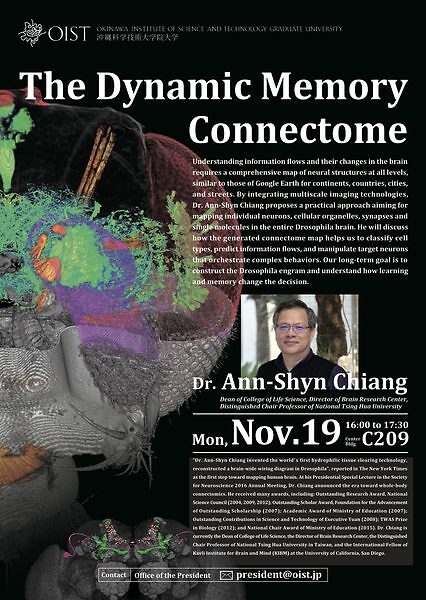"The Dynamic Memory Connectome" by Dr. Ann-Shyn Chiang

Date
Location
Description
The Dynamic Memory Connectome
Understanding information flows and their changes in the brain requires a comprehensive map of neural structures at all levels, similar to those of Google Earth for continents, countries, cities, and streets. By integrating multiscale imaging technologies, I propose a practical approach aiming for mapping individual neurons, cellular organelles, synapses and single molecules in the entire Drosophila brain. I will discuss how the generated connectome map helps us to classify cell types, predict information flows, and manipulate target neurons that orchestrate complex behaviors. Our long-term goal is to construct the Drosophila engram and understand how learning and memory change the decision.
Short Biography
Ann-Shyn Chiang Received Ph.D. (1990) and trained as a postdoctoral fellow (1992) in Rutgers University, Ann-Shyn Chiang joined Department of Life Science, National Tsing Hua University as an associate professor (1992), promoted as professor (1997), took sabbatical to study Drosophila memory at Cold Spring Harbor Laboratory (2001) and became the adjunct International Faculty of Kavli Institute for Brain and Mind (KIBM) at the University of California, San Diego (2011). For his contribution to our understanding of memory formation using a connectomics approach, Chiang was elected as an Academician of Academia Sinica (2014) and a fellow of The World Academy of Science (2016).
Chiang invented the world-first hydrophilic tissue clearing technology, reconstructed a brain-wide wiring diagram in Drosophila (the New York Times reported this discovery as the first step toward mapping human brain) and published the first Cell (2007) paper from Taiwanese scientists. Guiding by this connectomics map, he and his colleagues discovered that long-term memory formation requires new protein synthesis only in few brain neurons and published the first full article in Science (2012) from Taiwanese scientists. At his Presidential Special Lecture in the Society for Neuroscience 2016 Annual Meeting, Chiang announced the era toward whole-body connectomics. He received many awards, including: Outstanding Research Award, National Science Council (2004, 2009, 2012); Outstanding Scholar Award, Foundation for the Advancement of Outstanding Scholarship (2007); Academic Award of Ministry of Education (2007); Outstanding Contributions in Science and Technology of Executive Yuan (2008); TWAS Prize in Biology (2012); and National Chair Award of Ministry of Education (2015).
Chiang is currently the Dean of College of Life Science, the Director of Brain Research Center, the Distinguished Chair Professor of National Tsing Hua University, and the International Fellow of Kavli Institute for Brain and Mind (KIBM) at the University of California, San Diego.
Attachments
Subscribe to the OIST Calendar: Right-click to download, then open in your calendar application.



